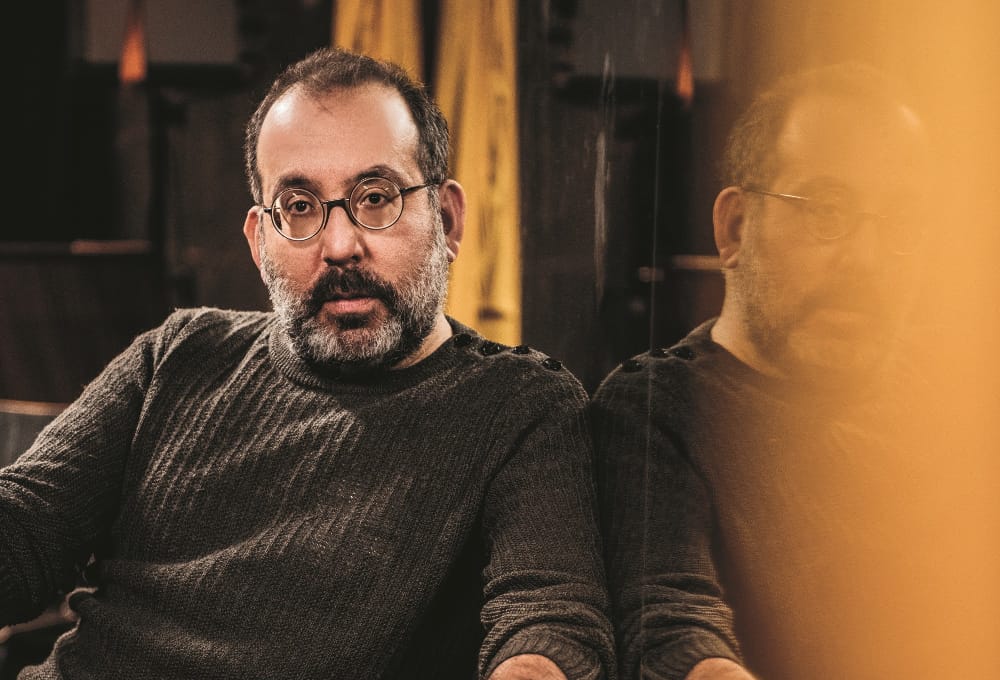Director Barrie Kosky in Conversation: First Glimpses of the New Opera Production “Káťa Kabanová”

In his new production of Leoš Janáček’s Káťa Kabanová, Barrie Kosky will emphasize the contrast and tension between the protagonist and her claustrophobic surroundings in a radical, severe form. He considers the Felsenreitschule the ideal venue for his production.
Janáček’s opera was last shown at the Salzburg Festival in 1998, conducted by Sylvain Cambreling and directed by Christoph Marthaler at the time.
In 2022 Jakub Hrůša conducts the Vienna Philharmonic in his Festival debut. Corinne Winters takes on the main role of Káťa, David Butt Philip that of her lover Boris. Jaroslav Březina appears as her husband Tichon, seeking solace in alcohol, while Evelyn Herlitzius sings the role of Káťa’s mother-in-law Kabanicha.
In conversation, Barrie Kosky reveals how he intends to give the story the archaic punch of a Greek drama, and what Janáček’s musical theatre has to do with chicken soup.
Salzburg Festival: Your Salzburg Festival debut, Offenbach’s Orphée aux enfers in 2019, was a stunning, fiendish joyride which turned out a triumph. Now Artistic Director Markus Hinterhäuser has invited you to return to Salzburg …
Barrie Kosky: And I immediately said: “Yes, but let’s do the opposite of Orpheus!” – So we put our heads together to figure out what that opposite might be. Finally Markus suggested: “Janáček!” And I answered: “Káťa!“ That has long been on my list of operas I want to direct – and pretty near the top, in the category of “jewels”. Furthermore, it’s important to me to keep switching between genres: I am taking a little break from operettas at the moment.
SF: Do you have a special relationship with Janáček?
BK: Actually, Káťa was the first Janáček opera I saw in my homeland. (Yes, indeed, Janáček is performed in Australia as well!) I saw the opera in Melbourne when I was fifteen, and I remember well how I was immediately enthusiastic about the music.
SF: What is extraordinary about this music?
BK: Janáček is unique in the opera repertoire not only for his manner of composing, but he also lived during a very interesting era in the history of musical theatre. He was born in 1854 – one year after the world premiere of La traviata, when Wagner was finishing the text of Rheingold. He died in 1928, a few years after the premiere of Wozzeck and one year after that of Oedipus Rex. So he sits between these gods – between Verdi and Wagner, and between Berg and Stravinsky in the 20th century – and in this company, he found his very own language. He is one of those composers where you hear a single measure and immediately know: that is Janáček.
At the same time, he had an incredible understanding and instinct for musical theatre. Jenůfa, The Makropulos Affair, From the House of the Dead – his subjects and his manner of transforming them into musical theatre are uncommonly fascinating. Yet his operas are rarely longer than an hour and a half. They are like an essence, like chicken soup – you take the bones and vegetables and boil them down until you have this concentrated, wonderful golden soup. That is how Janáček treats the music and drama. He often expresses in just two measures or one phrase what other composers require two pages for. It is truly remarkable.
SF: And he builds his operas around female figures, time and again.
BK: On the one hand, Janáček developed figures such as the Vixen, Jenůfa, Emilia Marty or Káťa, which are unique in 20th-century musical theatre and among the most fascinating female roles of all times. On the other hand, he had a real problem with women in his private life, and his treatment of them was pretty borderline and unkosher…
SF: You have directed one previous Janáček opera, From the House of the Dead, for which you won the Faust Theatre Prize. What makes Janáček so interesting to a director?
BK: The challenge is that everything is sort of naked – in the sense of exposed. Janáček offers no hiding place in the music or the drama. It is as if you were looking directly into people’s souls: you see nothing but bone, muscle and blood. Singing is the skin, but the character on stage is completely naked.
Janáček has an incredible ability to reveal figures in their human complexity, and to characterize them in a fewphrases, so you know immediately whom you are dealing with. Like Mozart, he does not judge. No one is simply good or evil; everything is shades of grey. The figures are all damaged in some way. I think these people move us so profoundly because we see ourselves reflected in them. These pieces are so sensational for the very reason that they hold up a mirror to our humanity. And that is also why Janáček’s operas leave us completely exhausted.
SF: Jakub Hrůša was engaged as a conductor by Markus Hinterhäuser, making his Salzburg Festival debut.
BK: Markus knows that I need a true partner in the orchestra pit. I cannot stage an opera in isolation from the musical aspects of the production. In my opinion, Jakub is the best Janáček conductor in the world right now, at least close to Charles Mackerras.
SF: You are staging the opera at the Felsenreitschule?
BK: When thinking of Káťa Kabanová, the first thing that comes to mind is a family drama, a chamber play, and perhaps one might expect a smaller stage. I, however, believe that the Felsenreitschule is the right place for the setting, this village or small town – but not as a realistic setting. I have seen enough Janáček productions stuffed to the brim with props to last me a lifetime! In my Káťa I limit myself essentially to bodies, singing, text and sound – and light. The lighting must be breath-takingly clear and intense. The opera is set in a town on the Volga. The river can be heard inthe orchestra. If you try to put water on stage, you don’t stand a chance. The music says it all, and I don’t want to duplicate that.
SF: So we will not see a village on stage?
BK: The piece focuses on Káťa’s claustrophobic situation. It is all about Káťa, and it is important to me to convey the contrast and the tension between her and the village in a radical, severe form. So together with our set designer Rufus Didwiszus, I decided that the village consists of the people; it is about Káťa’s isolation from these people. You won’t see any architecture; there are no walls, no doors, no tables, no chairs. The staging and choreography will make this constriction visible in a way which is more abstract and mysterious.
SF: What role does the Felsenreitschule as a location play in this?
BK: The enormous wall of the Felsenreitschule is oppressive as it is. In this atmosphere, we experience events from Káťa’s point of view, through her nightmarish feeling that no one wants to speak to her. The feeling of being locked up, however, is conveyed not only by walls or by a small space. Every word, every movement must feed it. This leads to a form of theatrical intensity which has the archaic punch of Greek drama. I believe that Janáček’s radiant, touching, highly emotional sound world, which Jakub Hrůša will create with the Vienna Philharmonic, will enter into a great, fascinating dialogue with this terrifying village on our stage.
SF: The play Káťa Kabanová is based on is set in a small Russian town in the mid-19th century; Janáček’s opera was first performed in 1921. Where do they intersect with our present times?
BK: I believe we need these pieces. Now more than ever. They have nothing to do with irony, and nothing to do with political dogmatism either. Instead they are about the core of being human, asking the essential questions: what is my life? How can I love someone? What is love? What constricts us in bourgeois life? Káťa Kabanová raises questions which are very close to us, without pointing a finger at them. I do not want to create the impression that all this is set in Russia or the Czech Republic – and has nothing to do with us. Instead, I will try to stage a drama for an hour and a half which the audience will follow from the first to the last measure with bated breath.
Translation: Alexa Nieschlag
Leoš Janáček (1854 – 1928)
Káťa Kabanová
Oper in Three Acts (1921)
Libretto by Leoš Janáček, based on the drama The Storm (1859) by Alexander Nikolayevich Ostrovsky as translated into Czech by Vincenc Červinka
New Production
Premiere: Sunday, 7 August
5 additional performances: 11, 14, 21, 26 and 29 August 2022
Jakub Hrůša Conductor
Barrie Kosky Director
Rufus Didwiszus Set Designer Victoria Behr Costume Designer Franck Evin Lighting
Christian Arseni Dramaturgy
Jens Larsen Savël Prokofjevič Dikoj
David Butt Philip Boris Grigorjevič
Evelyn Herlitzius Marfa Ignatěvna Kabanová (Kabanicha)
Jaroslav Březina Tichon Ivanyč Kabanov Corinne Winters Katěrina (Káťa) Benjamin Hulett Váňa Kudrjáš
Jarmila Balážová Varvara Michael Mofidian Kuligin and others
Concert Association of the Vienna State Opera Chorus Huw Rhys James Chorusmaster
Vienna Philharmonic
Kindly supported by Freunde der Salzburger Festspiele e.V. Bad Reichenhall





